VUFS
Urban Foodlands City of Vancouver Dialogue
Produced by Vancouver Urban Farming Society
Two online dialogues were hosted by VUFS in September 2020 to explore the positive outcomes from access to urban foodlands and what policies are needed to realize those outcomes relating to health, community connectedness, education, environmental stewardship, food self reliance, and dignity. Participants noted that equity, access, and decolonization must be prioritized to make those outcomes accessible for all community members.
The dialogues inspired and generated many policy ideas from the participants. The majority of policies discussed in this report are proposed changes to existing policies. A number of promising policies already exist in the City of Vancouver, such as the Parks Board’s Fieldhouse Activation Program, and we hope will be beneficial for other municipalities to consider
This project was made possible thanks to our 9 community partners that took part in the dialogue. We’d also like to thank the Public Health Association of BC for coordinating and the Real Estate Foundation for supporting this project. This dialogue happened in tandem with dialogues in Kamloops and Victoria, to inform a Provincial Report by Can You Dig It.
Policy and Possibilities: Recommendations for the City of Vancouver’s Urban Farm Guidelines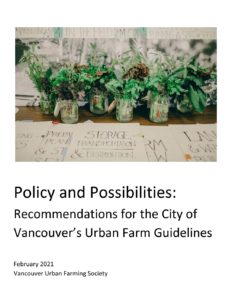
Produced by Vancouver Urban Farming Society
With this report VUFS recommends changes to the City of Vancouver’s Urban Farm Guidelines, passed in 2016, to help inform the city’s ongoing policy review. The report includes background on the Urban Farm Guidelines and presents findings of a policy scan that found examples of supportive urban farming policy in other North American jurisdictions.
This project is made possible with funding by the Real Estate Foundation of BC.
‘Class B’ Urban Farm Guidelines: Impacts and Recommendations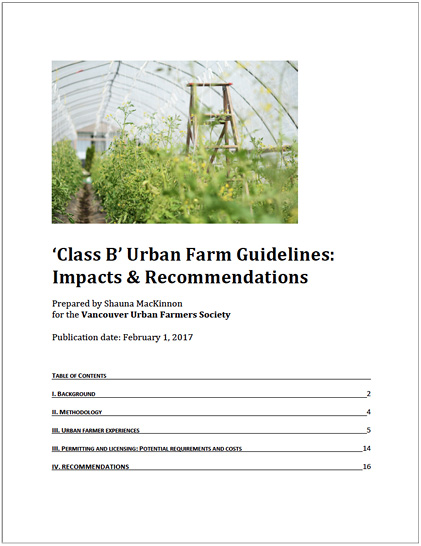
Prepared by Shauna MacKinnon for Vancouver Urban Farming Society
The primary objective of this report is to document the personal experience and perspectives of urban farmers categorized as Class B Urban Farms to more fully understand how the Urban Farm Guidelines affect them. The report includes background on the 2-year Urban Farm Guidelines pilot in Vancouver, describes the challenges that farmers are facing around the costs of permitting and upgrades to meet building code bylaws, and lays out recommendations for consultation, incentives, city investment, and research to create a more enabling environment for urban farming.
Urban Farming Practices in Metro Vancouver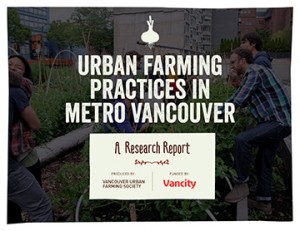
A Research Report
Produced by Vancouver Urban Farming Society
This document was written in a context that was continually shifting. At its inception, the Vancouver Food Strategy was still being crafted which since its adoption in January 2013 offers a clear directive to create urban farming policy for the City of Vancouver. We also witnessed some important additions to the ever growing repertoire of made-in-Vancouver and BC urban farming publications including the Urban Farming Guidebook, Land Access Guide, and the SOUL Organic Land Care Standards 6th Edition, which cover many of the same topics we set out to explore.
And so, what makes this document unique?
First, this work is not a guide on how to start or manage an urban farm. While we hope that it will be a huge asset to practicing and aspiring urban farmers, it will not tell you everything you need to know: there is no formula for how to be an urban farmer. This hunch of ours was affirmed after interviewing and surveying a total of 24 operations in Metro Vancouver listed earlier who are cultivating this urban region with approaches ranging from shipping container micro-green operations to backyard CSAs, parking lot farms, schoolyard market gardens, and a whole lot in between. Inherent in the movement’s complexity, diversity, and relative youth is a challenge in positing any singular practices as ‘best’.
Understanding our Practices from Seed to Scrap: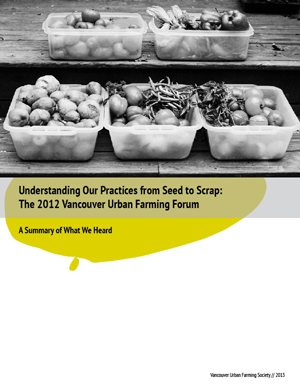
The 2012 Vancouver Urban Farming Forum
A Summary of What We Heard
Prepared by Zsuzsi Fodor & Shelby Tay
Research Coordinators, Vancouver Urban Farming Society
The first Urban Farming Forum, which took place in 2011, invited food security advocates, policy makers, and urban farmers alike to engage in vibrant discourse around urban farming, as well as discuss ways in which Vancouver’s Greenest City goals could be met in the context of urban farming policy. The 2012 installment, at the HiVE in Vancouver, was centered around urban farmers specifically to allow for a more concerted effort at data collection and discussion most relevant to the farmers themselves as part of a year long research project into urban farming practices in Metro Vancouver. We had 18 urban farming organizations from across Metro Vancouver participate and work with us to create a baseline landscape of urban farming practices throughout the region with a focus on the City of Vancouver. It was the beginning of the much larger community research process that is underway which looks even closer into the landscape of practices addressing what is working, what is not, and where the gaps are.
On Policy & Planning

Included in the Guidebook:
- Growth of the urban farming movement
- Characteristics of urban farming
- Stories from Campbell River, Kelowna, Vancouver and North Vancouver
- The Economics of Urban Farming
- Lessons for BC Municipalities

What feeds us: Vancouver Food Strategy
The Strategy includes 84 mentions of urban farming and page 58 of the document focuses specifically on urban farming including 7 priority action areas.
 The Delta Community-Based Farm District Plan – developed by Tara Moreau and Kimberley Hodgson – shows an example of how a community-based farm can be developed in southern British Columbia. “Community-based farming is the production, processing, distribution, and marketing of food and other products that cultivate direct connections between farmers and the adjacent community.”
The Delta Community-Based Farm District Plan – developed by Tara Moreau and Kimberley Hodgson – shows an example of how a community-based farm can be developed in southern British Columbia. “Community-based farming is the production, processing, distribution, and marketing of food and other products that cultivate direct connections between farmers and the adjacent community.”
Download the Plan PDF >>
Planning for Urban Sustainability: A case study of urban farming in Vancouver as an urban sustainable and ecological resilient practiceMasters Thesis in Human Geography by Kristin Edith Abrahamsen Kjærås at the University of Oslo
Abstract: This thesis is a qualitative case study of the mobilization and negotiation of urban farming, as an urban sustainable and economic resilient practice in the City of Vancouver…Considering the concurrent legal imposition of urban farming in this city, this case study analyzes how urban farming is advanced as a legitimate practice within different levels of the urban political terrain. Further, this thesis progresses insight into the concrete dynamics hindering and contributing to the mobilization and negotiation of urban farming as a legitimate practice in the City of Vancouver.
Read the full report >>
On Farming
Growing Vegetables in Metro Vancouver: an urban farming census
Schutzbank, Marc. 2012. Growing Vegetables in Metro Vancouver: an urban farming census. MSc.Thesis. University of British Columbia. Canada.
 Young Agrarians Land Access Guide
Young Agrarians Land Access Guide
The B.C. Land Access Guide provides a framework for new farmers looking to explore options for how to get on land. It is a guide for new entrants into sustainable agriculture to access land, with a focus on British Columbia, Canada. If you are an established farmer looking to negotiate a land access agreement, appendix B can support process.
Download the guide >>

COABC Small-Scale Certification Research Project
The Certified Organic Associations of BC (COABC) has been at work on a research project focuses on exploring Issues, challenges and options for small scale producers — the goal being to “better understand the needs and issues of non-certified organic producers which deter them from participating in organic certification programs, and investigate possible solutions.”
Read the findings in the project report here >>
The Greenhorns Guide for Beginning Farmers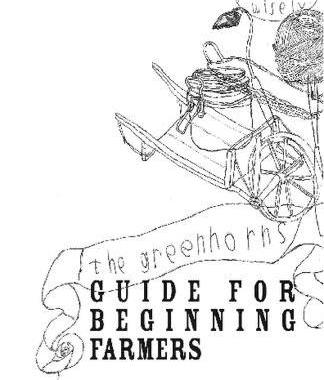
‘This is a guidebook written by young farmers, for young farmers. It is written to help you plan your professional trajectory into the field of sustainable agriculture. In this 30-page guide, we cover some of the major areas of institutional support for young farmers, some likely venues of learning and useful references. You should come away with a sense of how to approach the many hurdles with style, persistance, and improvisational zip.’
Download the PDF >>
 New Farmer’s Guide: Cultivating Success at Farmers Markets
New Farmer’s Guide: Cultivating Success at Farmers Markets
“New small farmers are key to building new farmers markets.” This manual, put together by Davis Farmers Market Association in California, seeks to provide an overview for new farmers, ranchers and food producers on engaging in direct marketing via farmers markets.
Download the Guide PDF >>

New guide to urban farming in New York State
The Cornell Small Farms Program released a free guide to urban farming in New York State. The 105-page resource guide looks at common questions about urban farming and is geared toward helping new farmers to launch, continue, or expand their urban farm business. It includes tips and fact sheets on topics including: Engaging communities, Dealing with contaminated soils, Intensive growing techniques, Urban composting, Site security, Urban livestock and Direct marketing options.
Download the guide pdf >>
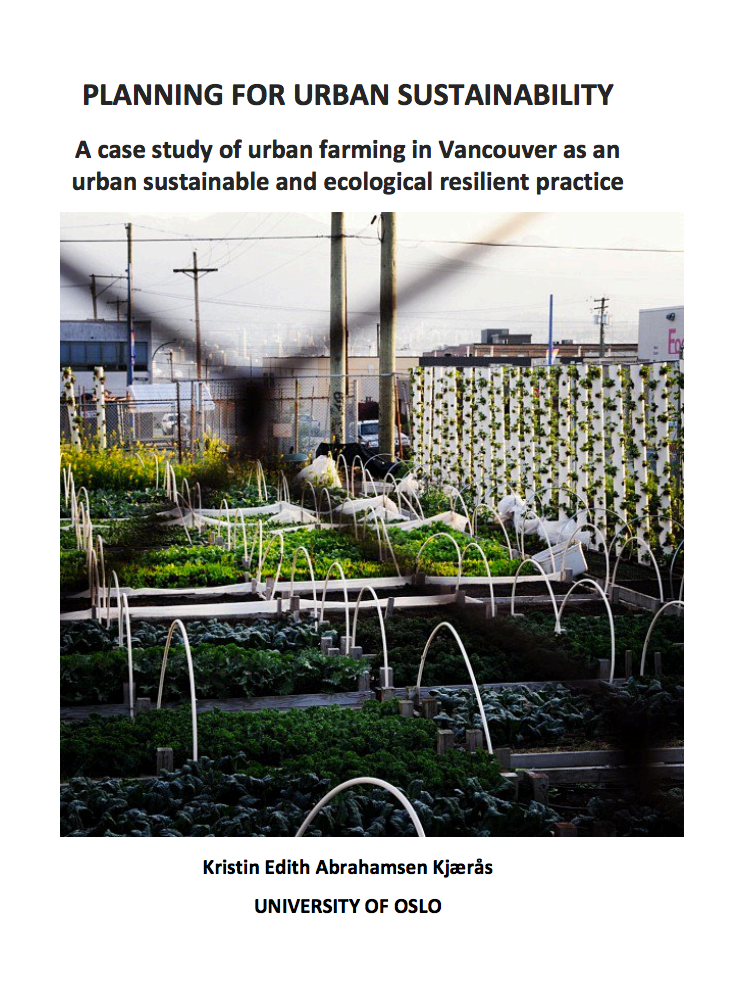
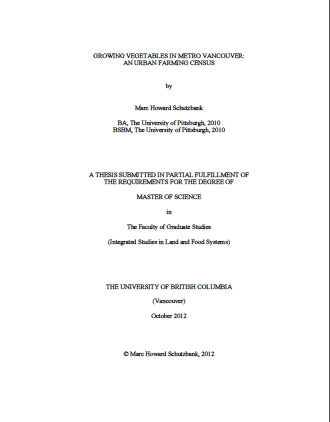
Follow Us